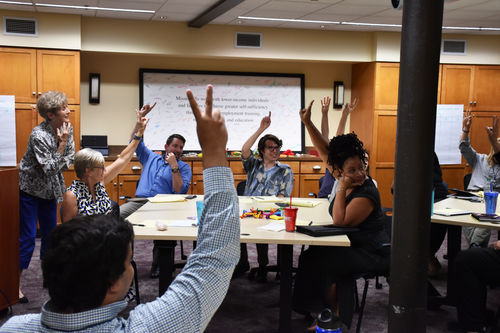How does PPL approach evaluation?
We hold time and space for evaluation at PPL because we see it as an important tool to strengthen our programming and, ultimately, strengthen our community. Our goal is an approach that is culturally responsive, collaborative, and supports shared learning.
We work to keep evaluation as simple and useful as possible. That means looking for ways to integrate it into programs. We also make sure we are using every piece of data we collect.
How are staff engaged organization-wide?
Our approach is really one of evaluation capacity-building. We want all staff to understand the importance of evaluation, to grow their skills and knowledge so they can use evaluation as a tool to understand and improve programs.
We like to recognize people who are using evaluative thinking, so everyone can see how evaluation is a lens through which to see their work.
Our internal Evaluation Committee hosts discussions and trainings for staff in which we tackle evaluation skills and offer ideas that can be immediately applied to their work.
Evaluation helps people quantify the results of their work so they can see how we're changing lives.
In what ways is PPL ahead of the curve on evaluation?
Our culture of learning makes it possible to engage deeply in this work. We encourage each other to ask what we call 'courageous questions.' We value transparency and dialogue and we're not afraid to challenge each other and help each other improve outcomes. It would be hard to engage in data-driven decision-making and program improvements outside of an open, trusting, and courageous culture.
I like how PPL is committed to asking courageous questions. I see my role as holding space for conversations about impact.
How does PPL's evaluation model help PPL deliver better outcomes?
Because we have consistent and systematic approaches to looking at the services we provide and their outcomes, we're able to be agile and make improvements quickly. We're able to intervene when we see it's needed, rather than waiting until year-end. The end goal of all of our evaluation work is to serve people better and increase our impact.
Additionally, participant feedback is another vital part of that equation. We have a good process for collecting participant input and feedback for existing programs, but we'd like to elevate the participant voice as we develop programs, too. That's what we're working on now.
What's your favorite Excel formula?
Concatenate; when I first learned it, it was life-changing! It saved so much time with analysis of our service program data.

